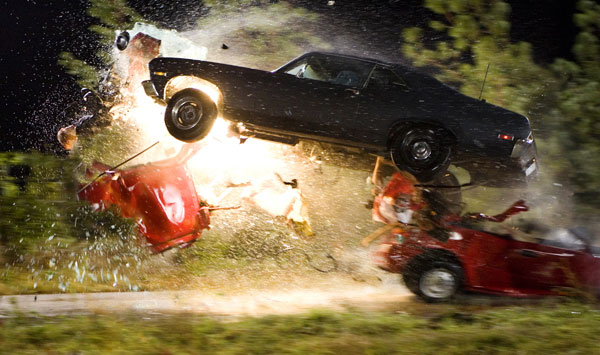“Here, I’m the referee, and I want a fair, true portrait of the man. How did Bush go from an alcoholic bum to the most powerful figure in the world? It’s like Frank Capra territory on one hand, but I’ll also cover the demons in his private life, his bouts with his dad and his conversion to Christianity, which explains a lot of where he is coming from. It includes his belief that God personally chose him to be president of the United States, and his coming into his own with the stunning, preemptive attack on Iraq. It will contain surprises for Bush supporters and his detractors.” No joke: Oliver Stone announces his next project will be a George W. Bush biopic, with Josh Brolin attached. I must admit, as someone who really liked Nixon, I’m curious to see where he goes with it.
Tag: Josh Brolin
2007 in Film.
Happy New Year, everyone. So unlike last year, when I took an extra month on account of my travels in New Zealand, the Best of 2007 Movie list seems ready to go out on schedule, and it’s below. (If you’ve been reading all the reviews around here, I’m betting the top few choices won’t be a surprise. Still, organizing the 5-15 section was more tough than usual this year.) At any rate, 2008 should be a big orbit around the sun in any event, what with grad school winding down and it being time — at last! — to pick a new president. So a very happy new year to you and yours, and let’s hope the movies of the coming year will contain to sustain, amuse, baffle, and delight.
[2000/2001/2002/2003/2004/2005/2006]


2. No Country for Old Men: It probably won’t do wonders for West Texas tourism. Still, the Coens’ expertly-crafted No Country works as both a visceral exercise in dread and a sobering philosophical rumination on mortality and the nature of evil. (And in his chilling portrayal of Anton Chigurh, Javier Bardem has crafted a movie villain for the ages.) People sometimes refer to Coen movies as “well-made” as a dig, as if the brothers were just soulless clinically-minded technicians. I couldn’t disagree with that assessment more. Still, No Country for Old Men seems so seamless and fully formed, so judicious and economical in its storytelling, that it reminds me of Salieri’s line in Amadeus: “Displace one note and there would be diminishment, displace one phrase and the structure would fall.” A dark journey that throbs with a jagged pulse, No Country for Old Men is very close to the best film of the year, and — along with Miller’s Crossing, Fargo, and The Big Lebowski — yet another masterpiece sprung from the Coens’ elegant and twisted hive-mind. Bring on Burn After Reading.

3. The Diving Bell and the Butterfly: Through the wonders of cinematic alchemy, Julian Schnabel took the sad real-life account of Vogue editor Jean-Do Bauby’s horrific imprisonment within his own body and made it soar. No other film this year put the “locked-in” experience of taking in a movie as inventively in service of its story (although I kinda wish Atonement had tried.) Special kudos to Mathieu Almaric for conveying so much with so little to work with, and to Max von Sydow for his haunting turn as Bauby’s invalid father. And, lest someone holds “arthouse foreign film” against it, Diving Bell is both much funnier and more uplifting than anyone might expect of a tale about hospital paralysis. Salut.
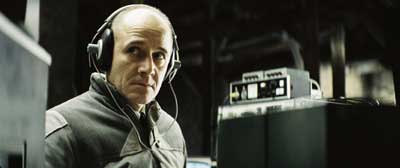
[3.] The Lives of Others: The one hold-over from 2006 on the list this year (I was pretty thorough about catching up before posting last January, although I still never did see Inland Empire), The Lives of Others is a timely and compelling parable of art, politics, surveillance, and moral awakening in the final days of the Stasi. In a way, Lives is an East German counterpart to Charlie Wilson’s War, a story about how even small political acts of individual conscience can change the world, even (or perhaps especially) in a decaying Orwellian state. With a memorable central performance by Ulrich Muhe and a languid conclusion that ends on exactly the right note, the resoundingly humanist Lives of Others is a Sonata for a Good Man in Bad Times. We could use more of its ilk.

4. Knocked Up: Judd Apatow’s sweet, good-natured take on modern love and unwanted pregnancy was probably the most purely satisfying film of the summer. As funny in its pop-culture jawing as it was well-observed in its understanding of relationship politics, Knocked Up also felt — unlike the well-meaning but overstylized Juno, the film it’ll most likely be paired with from now herein — refreshingly real. As I said in my recent review of Walk Hard, an eventual Apatow backlash seems almost inevitable given how many comedies he has on the 2008 slate. Nevertheless, we’ll always have Freaks & Geeks, and we’ll always have Knocked Up.

5. The Bourne Ultimatum: The third installment of the Bourne franchise was the best blockbuster of the year, and proved that director Paul Greengrass can churn out excellent, heart-pounding fare even when he’s basically repeating himself. Really, given how much of Ultimatum plays exactly like its two predecessors on the page — the car chase, the Company Men, the Eurotrash assassin, Julia Stiles, exotic locales and cellphone hijinx — it’s hard to fathom how good it turned out to be. But Bourne was riveting through and through…You just couldn’t take your eyes off it. I know I’ve said this several times now, but if Zack Snyder screws up Watchmen (and I’d say the odds are 50-50 at this point), the lost opportunity for a Greengrass version will rankle for years.

6. Zodiac: The best film of the spring. What at first looked to be another stylish David Fincher serial killer flick is instead a moody and haunting police procedural about the search for a seemingly unknowable truth, and the toll it exacts on the men — cops, journalists, citizens — who undertake it for years and even decades. Reveling in the daily investigatory minutiae that also comprise much of The Wire and Law and Order, and arguably boasting the best ensemble cast of the year, Zodiac is a troubling and open-ended inquiry that, until perhaps the final few moments, offers little in the way of satisfying closure for its characters or its audience. Whatever Dirty Harry may suggest to the contrary, the Zodiac remains elusive.

7. 28 Weeks Later: Sir, we appear to have lost control of the Green Zone…Shall I send in the air support? Zombie flicks have been a choice staple for political allegory since the early days of Romero, but one of the strengths of Juan Carlos Fresnadillo’s merciless 28 Weeks Later — perhaps the best horror sequel since James Cameron’s Aliens — is that it foregoes the 1:1 sermonizing about failed reconstructions and American hubris whenever it gets in the way of the nightmare scenario at hand. (Besides, if you wanted to see explicit muckraking about current events this year, there were options aplenty, from In the Valley of Elah to No End in Sight, although plenty of this year’s politically-minded forays — Rendition, Lions for Lambs — looked rather inert from a distance.) There’s little time for moralizing in the dark, wretched heart of 28 Weeks Later: In fact, the right thing to do is often suicide, or worse. You pretty much have only one viable option: run like hell.

8. In the Valley of Elah: Paul Haggis’ surprisingly unsentimentalized depiction of the hidden costs of war for the homefront, Elah benefits greatly from Tommy Lee Jones’ slow burn as a military father who’s lost his last son to a horrific murder. In fact, it’s hard not to think of Jones’ inspired performances here and in No Country of a piece. There was something quintessentially America-in-2007 about Jones this year. In every crease and furrow of this grizzled Texan’s visage, we can see the wounds and weariness of recent times, the mask of dignity and good humor beginning to slip in the face of tragic events and colossal stupidity. Jones is masterful in Elah, and while Daniel Day-Lewis seems to be garnering most of the accolades for There Will Be Blood and Philip Seymour Hoffman stunned in three pics this fall (all on the list below), I’d put Jones’ work here as the best of the year.

9. There Will Be Blood: Ah, the maddening There Will Be Blood. I just reviewed this one yesterday, so it’s doubtful my opinion on it has changed much. But what Anderson’s film reminds me of most at the moment (and not only for the Daniel Day-Lewis connection) is Scorsese’s Gangs of New York, a movie I reviewed at the end of 2002 and then bumped up a few spots a week later when writing the 2002 list, thinking that its flaws would diminish over time. They haven’t — if anything, they’re just as noticeable as ever. So it may well be with TWBB. Even despite its somewhat unseemly pretensions to greatness, the first hour or so of There Will Be Blood, from the Kubrickian opening to the Days in Heaven-ish burning oil rig, is as powerful and memorable as you could ever want in a film. But TWBB loses its way, and the second half is a significantly less interesting enterprise, ultimately culminating in that goofy, illogical bowling alley ending. I’d characterize Blood as a significant step forward for PTA, and there’s something to be said for getting even this close to a masterpiece. But he hasn’t struck black gold yet.

10. Hot Fuzz: While I personally still prefer Shaun of the Dead, this fish-out-of-water, buddy-cop action spectacle proved the droll British team of Nick Frost, Simon Pegg, and Edgar Wright can’t be considered one-hit-wonders (and that they’re as savvy about certain pop culture tropes as their American colleagues in the Apatow camp.) And, while I didn’t see Elizabeth II: The Golden Age, Hot Fuzz may well include the second-best Cate Blanchett performance of the year.
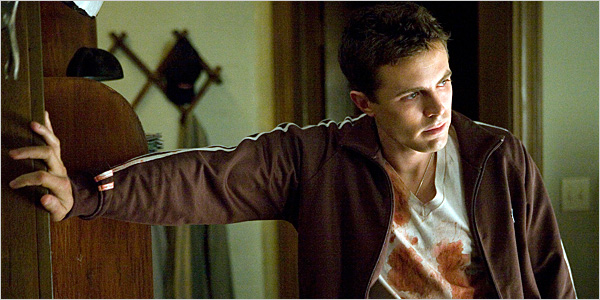
11. Gone Baby Gone: First-time director Ben Affleck acquits himself well with this chronicle of missing children and seedy n’er-do-wells in working-class Boston, wisely choosing to stick with a town and a leading man he knows like the back of his hand. His brother Casey holds his own, and crime author Dennis Lehane’s original source material provides some compelling twists-and-turns throughout. And, as the drug-addled, quick-to-dis Townie mom who’s lost her baby, The Wire‘s Amy Ryan gives arguably the Best Supporting Actress performance of the year (although she’ll likely get some run from Blanchett’s Jude Quinn.)

12. Michael Clayton: Clooney’s impeccable taste in projects continues with this, Tony Gilroy’s meditation on corporate malfeasance and lawyerly ethics (or lack thereof.) The bit with the horses still seems a convenient (and corny) happenstance on which to hang such a major plot point, and I found Tilda Swinton to be overly mannered and distracting for much of the film’s run. But most else about Michael Clayton, from Sidney Pollack’s Master of the Universe to Michael O’Keefe’s snide, unctuous #2 to Tom Wilkinson’s last scene to Clooney not rebounding as well to events as, say, Danny Ocean, rang true. A small film, in its way, but a worthwhile one.
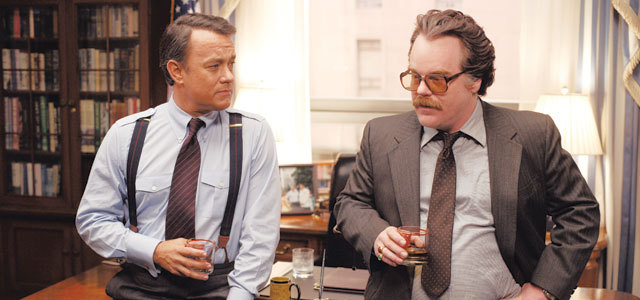
13. Charlie Wilson’s War: Another one I wrote on in the past 24 hours, so I don’t have much to add. Perhaps the best thing about Mike Nichols and Aaron Sorkin’s adaptation of Crile’s book is that it “gets” politics like few recent Washington thrillers I can think of. Philip Seymour Hoffman shows impeccable comic timing as the gruff Gust Avrakotos, and he works very well with Hanks here, who’s gone from being overexposed a few years ago back to a guy I wouldn’t mind seeing more of, particularly if he continues along the Alec Baldwinish character actor path Wilson sometimes suggests could be his future.
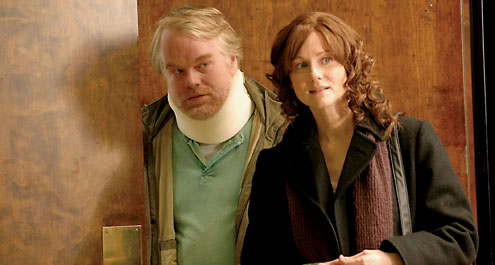
14. The Savages: I actually thought about putting Tamara Jenkins’ The Savages higher on this list, and few other movie endings this year hit me in the gut quite like this one. But, there are definite problems here, such as the wheezy Gbenga Akinnagbe subplot, which compel me to keep it here in the mid-teens. Still, this comedy about an ornery lion in winter, and the battling cubs who have to come to his aid, is a worthwhile one, and particularly if you’re in the mood for some rather black humor. As Lenny the senescent and slipping paterfamilias, Philip Bosco gives a standout performance, as does Hoffman as the miserable Bertholdt Brecht scholar trapped in deepest, darkest Buffalo.
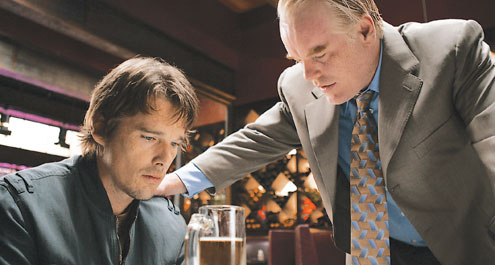
15. Before the Devil Knows You’re Dead: Now, Before the Devil is a movie I did end up seeing twice, on account of Brooklyn friends who were looking to catch it, and the film didn’t bring much new to the table on that second viewing. Still, Sidney Lumet and Kelly Masterson’s lean family tragedy benefits from several excellent performances — most notably by Hoffman, Ethan Hawke, Marisa Tomei, and Albert Finney, but also in supporting work by Amy Ryan, Michael Shannon, Brian O’Byrne, and Rosemary Harris — as well as a memorable Carter Burwell score. (Also, it’s just a coincidence that the three Hoffman movies ended up in a row like this — Still, it’s a testament to the man’s ability that he seemed unique and fully formed in each. Then again, the only time I can think of that Hoffman was actually bad in a film was Cold Mountain, which was pretty glitched up regardless.)

16. Sunshine: Along with There Will Be Blood, Danny Boyle and Alex Garland’s exasperating Sunshine is the other film this year that saw an amazing first hour become undone by breathtakingly poor choices on the back end. Unlike the halting, confused slide of TWBB, though, the moment where Sunshine slips the rails is clear-cut and irrefutable: It’s when what had been a heady science fiction tale about a near-impossible mission to the heart of the sun became instead an unwieldy space-slasher flick, i.e. basically an Armageddon variation on Jason X. The wreckage this subplot makes of what had been a superior hard-sci-fi film is more than a little depressing…Still, for that first hour, Sunshine is really something, perhaps the best realistically-portrayed outer space voyage we’ve seen on-screen in years.
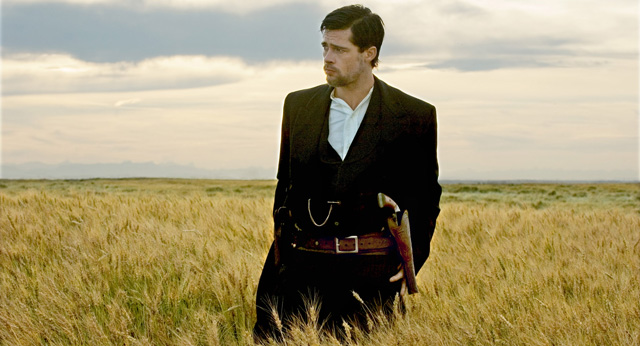
17. The Assassination of Jesse James by the Coward Robert Ford: Andrew Dominik’s sprawling psychological western about the end of the West and the early days of American celebrity-worship is every bit as ambitious and flawed as PTA’s There Will Be Blood. Still, maybe it’s the often stunning Roger Deakins cinematography, or the lively character actors (Sam Rockwell, Jeremy Renner, Garret Dillahunt) in the margins of the film, or maybe it’s even the terrible omniscient voiceover, which is every bit as distracting as the similarly ham-handed one in Little Children, and so goofy at times it verges on endearing. Whatever it is, I warmed to Jesse James more than I probably should, and for whatever reason I feel more willing to forgive it its considerable problems. If you blinked, you probably missed its theatrical run…but maybe it’ll find new life on DVD, when the 160-min running time won’t seem so off-putting.
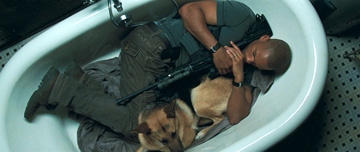
18. I am Legend: When the film focused on Will Smith and his dog fighting blood-sucking and badly rendered CGI Infecteds (whose level of social deevolution changed back and forth solely to accommodate turns in the plot), Francis Lawrence’s I am Legend could seem pedestrian and forgettable. But, when the movie focused on Will Smith and his dog fighting interminable loneliness in an eerily abandoned New York City, which was most of the first two-thirds of the film, I am Legend was a surprisingly melancholy and resonant blockbuster. What can I say? This one hit me where, and how, I live.
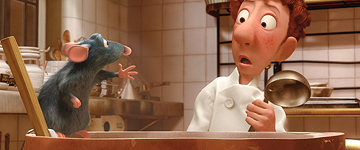
19. Ratatouille: There’s no review of this one up — I actually only saw it on DVD last week. And yet, while Ratatouille is a visual marvel (and Brad Bird and the PIXAR gurus don’t seem to make bad films), I found this nowhere near as inventive or entertaining as their last collaboration, 2004’s The Incredibles. (I’d put this one at about the level of Cars.) Now, this may in part be due to the fact that I have much more interest in comic book conceits than the culinary arts. (I’d even go so far as to say that I find many foodies — particularly those who blather on endlessly about Parisian cuisine — kind of insufferable.) Still, even given my relative lack of interest in the subject matter, Ratatouille bugged me. If “anyone can cook,” as Chef Gustave proclaims, why is no one’s input ever important but the rat? If it’s bad to make money selling pre-cooked (and affordable) food to the teeming masses, as Ian Holm’s character tries to do, why is it any better to do what Remy does? (And why should we care then when he and Gustave Jr. move into a deluxe apartment in the sky? I thought this enterprise wasn’t about making money.) In short, I thought Ratatouille wanted to have it both ways, cloaking a rather elitist, even snobbish story in the trappings of democratic tolerance. And the closing monologue by Peter O’Toole’s Anton Ego, which I thought ostensibly tried to make the movie critic-proof, irked me too. But, all that aside, it does look real purty.
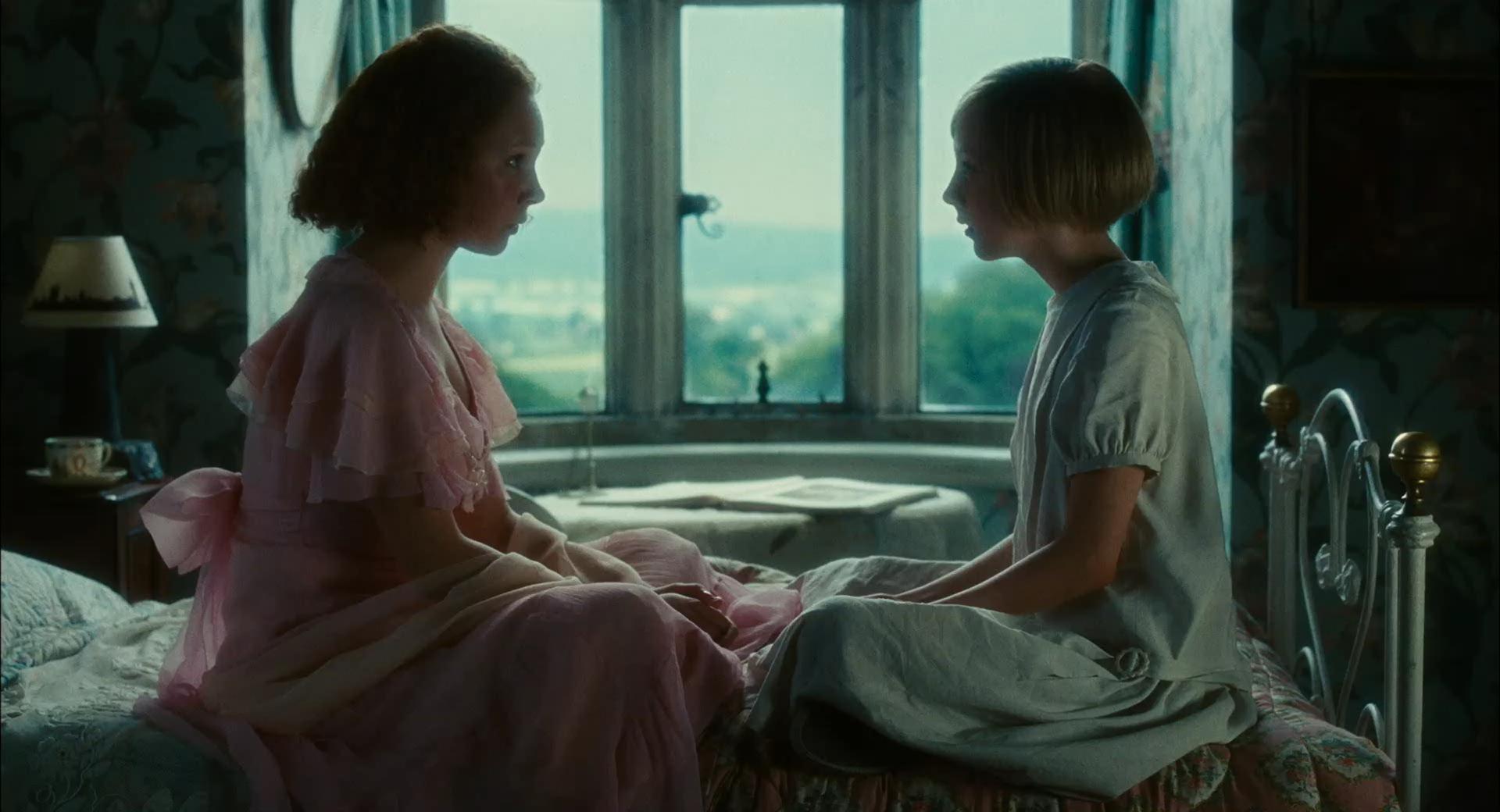
20. Atonement: There were several contenders for this last spot on this list, including Harry Potter and the Order of the Phoenix, The Simpsons Movie, and Jason Reitman’s Juno. But in the end I went with Joe Wright’s take on Ian McEwan’s novel, partly because people I trust who haven’t read the book beforehand haven’t shared my issues with the film. If nothing else, Atonement looks ravishing, and it features breakout performances by James McAvoy, Romola Garai, and Saiorse Ronan. Still, in a year that saw No Country and Diving Bell, I wish Wright had been less conventional in its approach to the story, and found a way to do the gloomy, misanthropic ending of McEwan’s novel justice.
Most Disappointing: The Golden Compass, Grindhouse, Spiderman 3, Southland Tales
Worth a Rental: 3:10 to Yuma, Beowulf, Eastern Promises, Harry Potter and the Order of the Phoenix, Juno, Live Free or Die Hard, Lust, Caution, Ocean’s 13, The Simpsons Movie, Stardust, Superbad, Walk Hard: The Dewey Cox Story
Don’t Bother: 300, Across the Universe, American Gangster, The Darjeeling Limited, Interview, The Invasion, Margot at the Wedding, The Mist, Pirates of the Caribbean 3: At World’s End, Transformers, You Kill Me
Best Actor: Tommy Lee Jones, In the Valley of Elah; Daniel Day-Lewis, There Will Be Blood
Best Actress: Ellen Page, Juno
Best Supporting Actor: Javier Bardem, No Country for Old Men
Best Supporting Actress: Amy Ryan, Gone Baby Gone; Cate Blanchett, I’m Not There
- A Good Year For:
- Casey Affleck (Assassination of Jesse James, Gone Baby Gone)
- Judd Apatow (Knocked Up, Superbad, Walk Hard)
- Josh Brolin (American Gangster, Grindhouse, In the Valley of Elah, No Country)
- Michael Cera (Superbad, Juno)
- Garret Dillahunt (No Country for Old Men, Assassination of Jesse James)
- Full-Frontal Parity (Diving Bell, Eastern Promises, I’m Not There, Walk Hard)
- Philip Seymour Hoffman (Before the Devil, Charlie Wilson’s War, The Savages)
- Tommy Lee Jones (In the Valley of Elah, No Country for Old Men)
- Man’s Best Friend (I am Legend, The Savages)
- Pregnant Hipsters (Knocked Up, Juno)
- Seth Rogen (Knocked Up, Superbad)
- Amy Ryan (Before the Devil, Gone Baby Gone)
- Texans (No Country for Old Men, Charlie Wilson’s War)
- The Western (3:10 to Yuma, Assassination of Jesse James, No Country for Old Men, There Will Be Blood)
- A Bad Year For:
- The Beatles (Across the Universe, Walk Hard)
- Josh Brolin’s PETA standing (American Gangster, No Country for Old Men)
- Great Cities (28 Weeks Later, I am Legend)
- Kidman/Craig Pairings (The Invasion, The Golden Compass)
- The Male Derriere (Charlie Wilson’s War, Margot at the Wedding)
- Standard-Issue Music Biopics(I’m Not There, Walk Hard)
2008: Be Kind, Rewind, Cassandra’s Dream, Cloverfield, The Curious Case of Benjamin Button, The Day the Earth Stood Still, Funny Games, Harold and Kumar Escape from Guantanamo, Harry Potter and the Half-Blood Prince, Hellboy 2: The Golden Army, In Bruges, The Incredible Hulk, Indiana Jones and the Kingdom of the Crystal Skull, Iron Man, James Bond 22, Jumper, Leatherheads, My Blueberry Nights, The Chronicles of Narnia: Prince Caspian, Revolutionary Road, Run, Fat Boy Run, Speed Racer, Star Trek, Valkyrie, Wall-E, Wanted, The X-Files 2…let’s see, am I missing anything…?

Welcome, 2008. I’ll see y’all on the other side.
In the Country of Last Things.
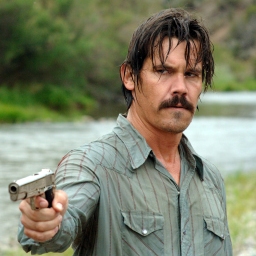 “Seen the arrow on the doorpost, saying, ‘This land is condemned’…” Well, Bob, East Texas may seem rough, but trust me, West Texas is even worse. I’m always going to have a soft spot for Miller’s Crossing, and The Big Lebowski is its own strange and beautiful beast, but the Coen Brothers’ tense, brooding No Country for Old Men, which I caught this morning, is right up among their best work, and that is no small thing. Admittedly, in some ways the Coens don’t seem quite right for a Cormac McCarthy adaptation: They usually thrive on witty, motormouth dialogue, but McCarthy’s men (Woody Harrelson’s character notwithstanding) are invariably strong, silent types. And you can feel the brothers trying to restrain their usual mordant sense of humor through much of the otherwise bleak No Country. (It still leaks out here and there: the mariachi band, “I pre-visioned it,” “these look to be managerial types,” the constant noting of the dead dog, and so on.) Nonetheless, for all intent and purposes, they nailed it. No Country is easily one of the better films out this year, and, if you harbored any doubts about the Coens after their botched remake of The Ladykillers, fret not. The brothers are back in form.
“Seen the arrow on the doorpost, saying, ‘This land is condemned’…” Well, Bob, East Texas may seem rough, but trust me, West Texas is even worse. I’m always going to have a soft spot for Miller’s Crossing, and The Big Lebowski is its own strange and beautiful beast, but the Coen Brothers’ tense, brooding No Country for Old Men, which I caught this morning, is right up among their best work, and that is no small thing. Admittedly, in some ways the Coens don’t seem quite right for a Cormac McCarthy adaptation: They usually thrive on witty, motormouth dialogue, but McCarthy’s men (Woody Harrelson’s character notwithstanding) are invariably strong, silent types. And you can feel the brothers trying to restrain their usual mordant sense of humor through much of the otherwise bleak No Country. (It still leaks out here and there: the mariachi band, “I pre-visioned it,” “these look to be managerial types,” the constant noting of the dead dog, and so on.) Nonetheless, for all intent and purposes, they nailed it. No Country is easily one of the better films out this year, and, if you harbored any doubts about the Coens after their botched remake of The Ladykillers, fret not. The brothers are back in form.
“The crime you see now, it’s hard to even take its measure.” No Country opens on the arid, forbidding landscape of west Texas, as we hear local sheriff Ed Tom Bell (Tommy Lee Jones, doing a lot of soul-searching this autumn between here and Elah), in voiceover, lament what the world has come to. As if to prove his point, we are then introduced to one Anton Chigurh (Javier Bardem, unforgettable), a chilling, wide-eyed psychopath with a lousy haircut, an air-powered cattle gun, and a penchant for making coin tosses with weighty implications. While Chigurh calmly breaks out of police custody (by strangling a deputy to death and murdering an unlucky motorist), a down-on-his-luck local named Llewellyn Moss (Josh Brolin) happens upon the scene of a horrific shootout in the middle of the desert, one which has all the markings of a drug-deal-gone-bad…including $2 million in a black briefcase. Thinking his ship has come in, Moss decides to takes the money and run. But, he’s savvy enough to expect some blowback, and thus sends his wife (Kelley MacDonald, of Trainspotting) off to her mother’s place in Odessa and vacates his old trailer park before hitting the road, traveling from motel to motel across west Texas. But right behind him, ruthless, inexorable, is Chigurh, armed with a transponder that follows the money. And, if Moss can’t stay one step ahead of the madman, or if Sheriff Bell doesn’t find a way to reach him before Chigurh does, there’ll be hell to pay like West Texas hasn’t seen since…well, probably since this morning.
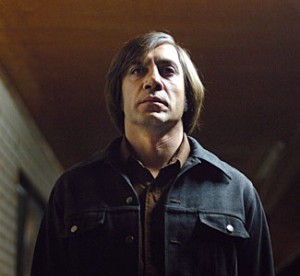 Having read the novel a few summers ago, I knew what I was getting into here, and thus (as with Chris Nolan’s The Prestige) I was prepared for a third-act jag that’s irritated a few moviegoers out there who expected a more conventional resolution. But, frankly, that’s the book. Near the end of No Country, one of the men we’ve been following tells us about two dreams he’s had recently: While it may seem in the early going that this movie is about the first, it’s actually more about the second. (Put another way, I’m guessing people who saw Lord of the Rings and thought the story was about the ring found all the endings to Return of the King more unnecessary and unsatisfying than those who thought the story was about Frodo and the fellowship.)
Having read the novel a few summers ago, I knew what I was getting into here, and thus (as with Chris Nolan’s The Prestige) I was prepared for a third-act jag that’s irritated a few moviegoers out there who expected a more conventional resolution. But, frankly, that’s the book. Near the end of No Country, one of the men we’ve been following tells us about two dreams he’s had recently: While it may seem in the early going that this movie is about the first, it’s actually more about the second. (Put another way, I’m guessing people who saw Lord of the Rings and thought the story was about the ring found all the endings to Return of the King more unnecessary and unsatisfying than those who thought the story was about Frodo and the fellowship.)
Yes, No Country is a crime yarn a la Fargo and Blood Simple, but it also has bigger game in its sights. One of the scariest aspects of Anton Chigurh is that he seems to believe himself an Agent of something else, something completely and utterly out of his control, and perhaps the scariest notion of all is that he might be right. “If the rule you followed brought you to this,” Chigurh tells one victim, “what was the use of it?” And would following any other rule have made any difference? Sheriff Bell is heartsick over the madness and grotesque violence that seeps out of the corners of society, and another aging lawman tries to lay the blame for “the dismal tide” on “kids with green hair and bones in their noses.” But, as another character reminds us, the West, and the world, has always been like this. You can’t stop what’s coming. At best, all you can do is light a fire in the dark.
The Haint of Harlem.
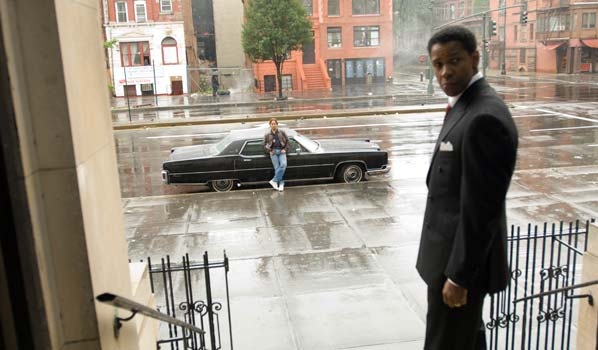
Superfly, Serpico, The French Connection…Ridley Scott’s American Gangster plays for most of its run like a greatest hits cover-medley of the cop and gangster thrillers of the 1970s. But, while well-made and eminently watchable, Gangster never becomes truly engaging. (EW’s Owen Gleiberman pretty much nailed it when he called the film “a ghost version of a 70’s classic.”) It’s hard to fault the superior production values or the large, impressive cast, which is chock-full of ringers in even the smallest of roles. But for all the quality on display, American Gangster doesn’t come close to matching the mischievous vibrancy of Denzel Washington’s last 70’s homage, Spike Lee’s Inside Man, nor is it even the best attempt at a throwback 70’s cop flick this year — that would be David Fincher’s haunting Zodiac. Gangster hits its beats well enough, which isn’t surprising given that Ridley Scott’s at the helm. But, however gritty and lived-in at times, it’s still missing the pulse that would make it a truly memorable movie. Frank Lucas may be an O.G., but Gangster, frankly, could’ve benefited from more in the way of originality.
As Gangster opens, we witness the aforementioned Frank Lucas (Washington) lighting a bound man on fire and then unloading a clip into him — from the get-go, this guy clearly has a dark side. We then watch him watching his mentor, “Bumpy” Johnson (Clarence Williams III) doling out Thanksgiving turkeys to the people of Harlem from the back of a truck, driving home, a la Willie Stark in All the King’s Men, the importance of public perception in maintaining a criminal empire. Bumpy lives just long enough in the film to impart some choice lessons in vertical integration before he succumbs to a heart attack, leaving Lucas to take over and consolidate the Harlem drug trade. This Lucas does by bypassing all the usual middlemen — the Italian mafia, crooked cops, etc. — and procuring his heroin supply direct from the source, deep in the jungles of Southeast Asia, thus enabling him to sell purer stuff on the streets at a cheaper price. (The product gets into the country by way of U.S. military planes coming back from Vietnam.)
As this new drug empire grows — and stays mostly under the radar, thanks to Lucas’ emphasis on ignoring flash — we also follow the story of one Richie Roberts (Russell Crowe). As cops go, Roberts is old-school: He prides himself on his honesty and incorruptability despite his intimate connections with some mid-level mafiosi, his flagrant sleeping around (which has turned his failed marriage to Carla Gugino into an ugly custody battle) and the fact that every other po-lice in his unit — and in NYC, for that matter — seems to be on the take. Eventually, of course, Det. Roberts sets his sights on Lucas, and the game truly begins…
But, game or no, everybody knows the dice are loaded. Part of the problem with American Gangster is that there’s no real mystery about how it’ll all turn out in the end. Even if you don’t know a thing about Lucas going in (and I didn’t), these sorts of movies invariably follow a rather predictable pattern, and all the police procedural work, Harlem vignettes, or heroin house of horror asides throughout here can’t hide the fact that Gangster follows it to the letter. Also, while Washington and Crowe are both among some of the best actors working today, neither is given much to work with here. As a hard-working, quick-witted family man who prizes loyalty and doesn’t take any guff from those around him, the Frank Lucas character is right in Denzel’s usual wheelhouse, even despite the additional sociopathic streak. (His turn in Training Day seemed more of a stretch.) And Crowe’s Roberts is well-played but, frankly, not all that interesting as written. Crowe can definitely do conflicted cops — Exhibit A, L.A. Confidential — but this is the first performance by him that I can remember that doesn’t make much of an impression.
And that doesn’t just go for the top two. American Gangster boasts a veritable Murderer’s Row of quality, likable character actors in its credits — not only Williams and Gugino but Chiwetel Ejiofor, Idris Elba, Josh Brolin, Joe Morton, Jon Polito, John Hawkes, John Ortiz, Ruby Dee, and rappers RZA and Common (as well as Cuba Gooding Jr. and Norman Reedus) — but more often than not they just get lost in the shuffle here. (That being said, Armand Assante, overplaying his genteel mafia don to the hilt, does manage to squeeze in a particularly lousy performance.) Not to be too harsh, Gangster isn’t a terrible film, nor even really a bad one. But, however well-made, it’s more by-the-numbers than it is blue magic.

Call it, Friendo.
[Update 3/26/08: Welcome. My review of No Country for Old Men is here, and the film review archive is here.]
The Coen Brothers’ No Country For Old Men, my most anticipated movie of the fall season, has a new trailer out. The film stars Josh Brolin, Javier Bardem, Tommy Lee Jones, Kelley MacDonald, Woody Harrelson, Stephen Root, and Garret Dillahunt, and it looks frickin’ fantastic. (And, also up this evening, a new trailer for Aliens v. Predator: Requiem. It looks…less fantastic.)
No Country for Young Men.
 [Review, take 2.] Every day I think I’m going to wake up back in the desert… I must say, I went in expecting not much more than an over-the-top “message movie” schmaltzfest, or at best a harmless helping of mediocre, inert Oscar Bait like Cinderella Man or A Beautiful Mind. But Paul Haggis’ In the Valley of Elah, the first of four(!) movies I caught last Saturday, turned out to be quite a bit better than I expected. Rather, Elah is a melancholy rumination on the hidden casualties of (any) war and a somber inquiry into the heavy toll exacted on the wives, parents, and children of military men. (The families of military women will likely get their due in John Cusack’s forthcoming Grace is Gone.) The David and Goliath nonsequitur of its title notwithstanding, Elah more often brings to mind the questionable sacrifice for an unknown higher purpose in Abraham and Isaac, or the bloody fate of erstwhile brothers Cain and Abel. And, biblical parallels aside, the film showcases the best work Tommy Lee Jones has done in years. (Well, I didn’t see The Three Burials of Melquiades Estrada, and have high hopes for No Country for Old Men.) And it’s probably the most engaging police procedural of the year this side of Zodiac.
[Review, take 2.] Every day I think I’m going to wake up back in the desert… I must say, I went in expecting not much more than an over-the-top “message movie” schmaltzfest, or at best a harmless helping of mediocre, inert Oscar Bait like Cinderella Man or A Beautiful Mind. But Paul Haggis’ In the Valley of Elah, the first of four(!) movies I caught last Saturday, turned out to be quite a bit better than I expected. Rather, Elah is a melancholy rumination on the hidden casualties of (any) war and a somber inquiry into the heavy toll exacted on the wives, parents, and children of military men. (The families of military women will likely get their due in John Cusack’s forthcoming Grace is Gone.) The David and Goliath nonsequitur of its title notwithstanding, Elah more often brings to mind the questionable sacrifice for an unknown higher purpose in Abraham and Isaac, or the bloody fate of erstwhile brothers Cain and Abel. And, biblical parallels aside, the film showcases the best work Tommy Lee Jones has done in years. (Well, I didn’t see The Three Burials of Melquiades Estrada, and have high hopes for No Country for Old Men.) And it’s probably the most engaging police procedural of the year this side of Zodiac.
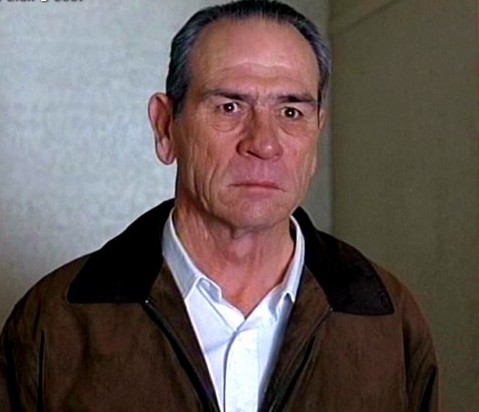 “Dad?” Roused from a dream he can barely grasp the edges of, grizzled Vietnam Vet turned mechanic Hank Greenfield (Jones) is awoken one Tennessee morning by a call from faraway Fort Rudd, informing him not only that his son Mike is back from Iraq but has gone AWOL since getting back stateside. This doesn’t gibe with Hank, who’s been receiving image-laden e-mails from his second son during his tour (his first son already perished in his nation’s service), and so he packs his bags, kisses his wife (Susan Sarandon) goodbye, and drives straight through to New Mexico, looking to ascertain the score.
“Dad?” Roused from a dream he can barely grasp the edges of, grizzled Vietnam Vet turned mechanic Hank Greenfield (Jones) is awoken one Tennessee morning by a call from faraway Fort Rudd, informing him not only that his son Mike is back from Iraq but has gone AWOL since getting back stateside. This doesn’t gibe with Hank, who’s been receiving image-laden e-mails from his second son during his tour (his first son already perished in his nation’s service), and so he packs his bags, kisses his wife (Susan Sarandon) goodbye, and drives straight through to New Mexico, looking to ascertain the score.
The sergeant on duty at Ft. Rudd (James Franco) and Mike’s returning platoon members all think he’s just shacked up with a good time woman somewhere…but Hank’s not so certain. And, just as he’s beginning to tease clues off Mike’s damaged cameraphone, a charred, mutilated, and dismembered body is discovered on the outskirts of town. Sure enough, it’s Mike, and as the ensuing homicide investigation slips into the jursidictional crack between local law enforcement (most notably represented by Charlize Theron) and the Military Police (headed by bureaucrat Jason Patric), Hank takes it on himself to bring his son’s murderer to justice. But, as Hank well knows, the dogs of war impart a moon-touched madness on those they’ve mauled, and Hank will be forced to confront some ugly truths about his son, and the man he became in Iraq, in order to get to the bottom of things.
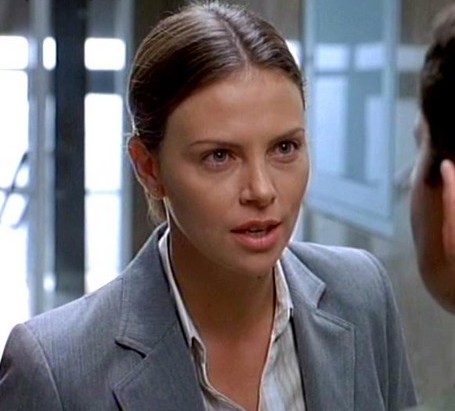 Admittedly, the movie starts out kinda rocky (or perhaps I was just gunning for Haggis in the first reel.) Events occur early on that scream symbolic significance (you’ll know what I mean), people speak in characterization shorthand — “Someday, you’ll just have to trust somebody, Hank” — and some plot points just don’t hang together. How did Hank ever find that (symbolically-named) computer guru operating out of a van, and why does it take him so ever-loving long just to do a defrag? But, for whatever reason — my money’s mostly on Jones — Elah is a significantly subtler and more resonant film than I ever expected from the writer-director of the lamentable Crash. (Then again, a ball-peen hammer to the skull is subtler than Crash, a film which, as I noted in my review of Inside Man last year, feels like it was made by and for people who don’t get out very much.)
Admittedly, the movie starts out kinda rocky (or perhaps I was just gunning for Haggis in the first reel.) Events occur early on that scream symbolic significance (you’ll know what I mean), people speak in characterization shorthand — “Someday, you’ll just have to trust somebody, Hank” — and some plot points just don’t hang together. How did Hank ever find that (symbolically-named) computer guru operating out of a van, and why does it take him so ever-loving long just to do a defrag? But, for whatever reason — my money’s mostly on Jones — Elah is a significantly subtler and more resonant film than I ever expected from the writer-director of the lamentable Crash. (Then again, a ball-peen hammer to the skull is subtler than Crash, a film which, as I noted in my review of Inside Man last year, feels like it was made by and for people who don’t get out very much.)
In any case, Tommy Lee Jones is really excellent here: Check out the scene where he has to ID his son’s body in the morgue, or note how his early military rectitude seeps away as he sinks into the slough of despond. And Jones isn’t alone. Sarandon is memorable in every short scene she’s in, Theron is surprisingly believable as an ordinary (albeit beautiful) cop, and Patric — a dependable actor who never quite made it as a lead — seems to relish the freedom of his oncoming, paunchy Val Kilmer/Alec Baldwin phase. His “on a need to know basis” character in particular could’ve been way over the top, but Patric underplays him as a guy who really just doesn’t want to do the paperwork. (There’s also a brief but solid turn by Josh Brolin, Jones’ Coen compadre, as the local sheriff.)
Elah isn’t the best movie of the year or anything. But it is most of everything you’d want out of a fall film — It’s timely, sober-minded, well-acted and well-made. And, if nothing else, it shows Haggis has the ability to reboot after Crash.
Old Man, Look at Your Life.
Sorry, Harvey: Javier Bardem’s sinister Anton Chigurh has stolen your signature move… Two new trailers for the Coens’ much-anticipated No Country for Old Men, based on the (solid) Cormac McCarthy novel and starring Bardem, Tommy Lee Jones, Josh Brolin, Kelly MacDonald, Garret Dillahunt, and Stephen Root, are now online at the official site.
Unforgiving.
As seen on Aint-It-Cool, and by way of Variety, the trailer for the Coen’s much-anticipated take on Cormac McCarthy’s No Country for Old Men, starring Josh Brolin, Javier Bardem, Tommy Lee Jones, Kelly MacDonald, Woody Harrelson, and Stephen Root, is now online. Looks like the Coens are back in form (and looks like they captured the tone of the book perfectly.)
Portraits of Urban Decay.
A few recent additions to the trailer bin: Will Smith finds a lot of alone time in New York City in the way-over-the-top teaser for Francis Lawrence’s I am Legend (which looks nothing like the Richard Matheson novella and only slightly more like the last version, Charlton Heston’s The Omega Man); Denzel Washington and Russell Crowe, sporting Zodiac-era duds and dos, go mano a mano (again) in the trailer for Ridley Scott’s American Gangster (also with Chiwetel Ejiofor, Carla Gugino, and Josh Brolin); and Jodie Foster gets all Bernie Goetz up in here — much to the dismay of Terrence Howard — in the new trailer for Neil Jordan’s The Brave One. Update: Ok, one more. President William Hurt is shot! (Or is he?) And secret servicemen Dennis Quaid and Matthew Fox, along with a Zapruderish Forest Whitaker, Sigourney Weaver, and others, must get to the bottom of it all in the new trailer for Pete Travis’s Vantage Point.
A Bit of a Grind.
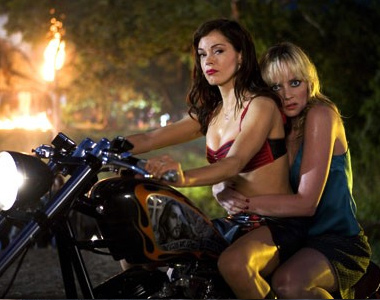
So, Grindhouse. Frankly, it seems a bit late to post this review. Those limited few who had any interest in this two-director vanity project caught it that first weekend, and it’s completely nose-dived since (so much so that even Harry Potter and the Order of the Phoenix is now being scaled back to escape a similar fate, as if that were ever going to happen.) But, for completists’ sake, I found Robert Rodriguez and Quentin Tarantino’s homage to the violent, smutty B-movies of yesteryear to be a fun idea at first, but not nearly entertaining enough to merit the three-and-a-half-hour slog. Some of the fake trailers, particularly Rodriguez’s Machete (i.e. the Mexican Shooter) and Edgar Wright’s Don’t, are chuckle-inducing, and there’s a certain goofy relish to be taken in the Z-grade John Carpenterisms of Rodriguez’s Planet Terror, if you were ever a late-night Cinemax addict or grindhouse aficionado (I was not the latter — I’m too young for the whole Grindhouse scene, frankly, which may explain why the film bombed so badly. When even cinephiles in their early thirties missed the nostalgia train Rodriguez and Tarantino are serving up, that’s going to seriously eat into your audience figures.) But, otherwise, Grindhouse reminded me more than anything else of Trey Parker and Matt Stone’s Team America: World Police — a film that started off enjoyably, but ultimately became too much like its object of parody (there, bad action films; in this case, bad ’70’s movies.) And Tarantino’s Death Proof is to my mind just an egregious misfire, but more on that in a bit.
The first half of the Grindhouse bill is Robert Rodriguez’s Planet Terror, a sort of John Carpenter meets George Romero zombie flick in which a good-hearted stripper (Charmed‘s Rose McGowan) and her bad-ass trucker ex (Six Feet Under‘s Freddy Rodriguez — let’s hear it for short action stars) must rally a small Texas town against the flesh-devouring zombies in their midst (Said zombies were created by a wayward toxic cloud unleashed by the unholy tandem of Osama Bin Laden and Bruce Willis.) In keeping with the Grindhouse milieu, Planet Terror is, by design, a lousy film — its only upside comes in feeling in on the joke. And I will admit to sorta stupidly enjoying myself through most of Rodriguez’s half of the show, be it due to Josh Brolin’s low-grade Nick Nolte (as an HND poster noted), Rodriguez blasting away on a mini-bike, the CGI-enhanced sloppy edits and film deterioration, or the perfectly cheesy synth score. (And, really, who better to play redneck brothers in a capital-B-movie than Jeff Fahey and Michael Biehn? Speaking from a purely fanboy perspective, it was just great to see Hicks/Reese again on the big screen.) In short, Planet Terror is, frankly, kinda awful: I wouldn’t sit through it again, and I can’t even come close to recommending it. But it’s a better bad film than, say, From Dusk Till Dawn, the last time Rodriguez and Tarantino tried this gag, and for its first hour at least I found myself going along reasonably contentedly on the terrible-movie-ride I was promised.
But, then comes Quentin Tarantino’s Death Proof, which admittedly I’m holding to higher expectations. Rodriguez has shown himself over the years basically to be a prolific and well-meaning hack. But, from Reservoir Dogs — a movie that blew me away as an 18-year-old Blockbuster clerk — to Pulp Fiction, the thrill ride (and soundtrack) of my sophomore year in college, to Jackie Brown, still Tarantino’s most mature and accomplished work, QT seemed like he might be a true auteur, a guy who could recombinate his extensive knowledge of cinema with his sheer passion for movies to create a career’s worth of films for the ages. But, like Kill Bill Vol. 1 and Kill Bill Vol. 2, Death Proof marks another self-satisfied retreat into Tarantino’s narrowly-defined, solipsistic fanboy universe. To be honest, even though I was bored through much of Kill Bill 1, I never expected him to make a movie this dull.
Basically, Death Proof examines the fate of two female quartets — one in Austin, one in Tennessee — after they encounter the dark, dangerous, and wheedling persona of one Stuntman Mike (Kurt Russell, winking back to his Carpenter roots), a homicidal stalker with a “death-proof” car. But, despite its schlocky set-up, Death Proof is way too talky to have ever made much headway in a real grindhouse: The film is mostly comprised of these gangs of four nattering endlessly in unrealistic fashion about boys, music, or whatever else comes to mind, and each and every one of them talks and acts like Quentin Tarantino in wish-fulfillment mode: Amidst the MF and N-bombs, these beautiful gals name-drop movies like Zatoichi and Vanishing Point or esoteric bands like Dave Dee, Dosy, Beaky, Mich & Tich, all the while showing off their sumptuous feet and eventually, of course, kicking ass and taking names. (Yes, we already saw this in Kill Bill. In fact you could argue Tarantino’s cameo as a fiend-rapist who gets his just desserts in Planet Terror is all of Death Proof in a nutshell.) Really, Tarantino’s ear has never been so off. It being a grindhouse/exploitation flick, QT can get away with unrealistic women…but boring is its own problem.
At any rate, as you might guess from the plot, the last half hour or so of Death Proof involves a car chase between Russell and one of the aforementioned quartets, but that isn’t much more interesting than all the interminable chat we’ve already labored through. (Some reviews have pegged this as a bravura moment in car chase cinema — I thought it was dull even compared to recent stuff like The Bourne Supremacy or Ronin, to say nothing of flicks like The French Connection.) There’s one exceptionally haunting scene involving Vanessa Ferlito’s very last encounter with Stuntman Mike that suggests Tarantino might still have a few tricks up his sleeve, if he ever gets his act together some day. But, all in all, Grindhouse suggests more than anything else that he’s still stuck in the Kill Bill rut. What he probably needs to do is try to adapt someone else’s work again, a la Jackie Brown, before indulging in yet another B-movie flight of fancy like the Kill Bills and Death Proof. As it is, Tarantino’s flicks are sadly becoming a bit of a grind.
